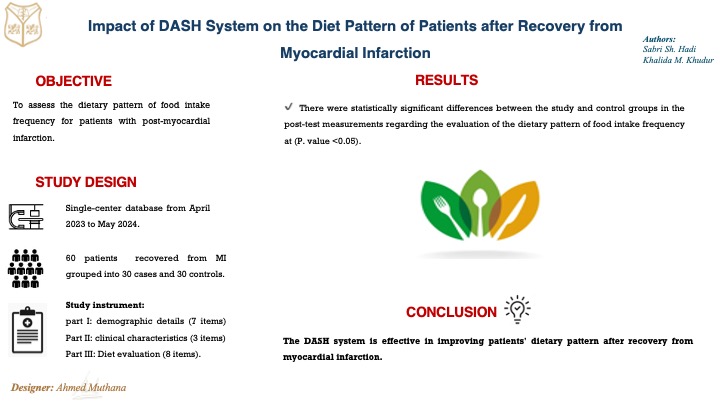Impact DASH System on Patients' Dietary Pattern after Recovery from Myocardial Infarction
DOI:
https://doi.org/10.32007/jfacmedbaghdad.6632348Keywords:
Dietary Approaches, Dietary Assessment, Dietary Pattern, Healthy Diet, Hypertension, Myocardial Infarction.Abstract
Background: One of the top three causes of death and morbidity is cardiovascular disease Myocardial infarction is a clinical illness defined by quickly growing severe myocardial ischemia. It is the most frequent health problem in the world and the main cause of mortality.
Objectives: The study aims to assess the dietary pattern of food intake frequency for patients with post- myocardial infarction.
Patients & Methods: The quasi-experimental design has been carried out to determine the impact of the Dietary Approaches to Stop Hypertension system on patients with post-myocardial infarction, in the Al-Diwaniyah Teaching Hospital's cardiac outpatient clinic for the period from 17th April 2023 to 3rd May, 2024. Nonprobability (purposive) sample of (60) patients were selected who recovering from myocardial infarction at AL Diwaniyah Teaching Hospital. The study instrument comprised of (3) parts: part I: demographic details of the patient, which included seven items. Part II: Data on clinical characteristics, consisting of (3) items and Part III: Evaluation of diet frequency consisting of (8) items.
Results: The study results showed that most of the food groups were (less than the Recommended Daily Servings) in pre-test, then became (Equal to the Recommended Daily Servings) in post-test in the study group. While most of the food groups were (Less than the Recommended Daily Servings) in pre-test and post-test in the control group. Also, there were statistically significant differences between the study and control groups in the post-test measurements regarding the evaluation of the dietary pattern of food intake frequency at (p. value <0.05).
Conclusions: The DASH system was effective in improving the dietary pattern of patients after recovery from myocardial infarction. And in assessing food intake frequency and the dietary pattern at p. value <0.05). There were statistically significant differences between the study and the control group on the post-test measures.
Received: March 2024
Revised: May 2024
Accepted: June 2024
Downloads
References
Kanda D, Ikeda Y, Takumi T, et al. Impact of nutritional status on prognosis in acute myocardial infarction patients undergoing percutaneous coronary intervention. BMC Cardiovascular Disorders. 2022;22(1):3. https://doi.org/10.1186/s12872-021-02448-x
Herliani YK, Rahayu U, Purba CIH, et al. Patients’ needs on nutritional counseling and risk factor management among myocardial infarction patients in cardiac rehabilitation. Journal of Nursing Care. 2019;2(2). https://doi.org/10.24198/jnc.v2i2.22082
Amen SO, Baban ST, Yousif SH, et al. Prevalence of the most frequent risk factors in Iraqi patients with acute myocardial infarction. Medical Journal of Babylon. 2020;17(1):6-18. https://doi.org/10.4103/MJBL.MJBL_66_19
Skal BM, Ahmed SA. Effectiveness of an Educational Program on Nurses' knowledge about Risk Factors for Bleeding of Acute Myocardial Infarction in Patient Receiving Thrombolytic Therapy at Coronary Care Unit in Al-Diwaniya Teaching Hospital. Indian Journal of Forensic Medicine & Toxicology. 2021;15(3). https://doi.org/10.37506/ijfmt.v15i3.16257.
Townsend N, Nichols M, Scarborough P, et al. Cardiovascular disease in Europe—epidemiological update 2015. European heart journal. 2015;36(40):2696-705. https://doi.org/10.1093/eurheartj/ehv428
Jones NR, Forouhi NG, Khaw K-T, et al. Accordance to the dietary approaches to stop hypertension diet pattern and cardiovascular disease in a British, population-based cohort. European journal of epidemiology. 2018;33(2):235-44. https://doi.org/10.1007/s10654-017-0354-8
Said MS, El Sayed IT, Ibrahim EE, et al. Effect of DASH diet versus healthy dietary advice on the estimated atherosclerotic cardiovascular disease risk. Journal of Primary Care & Community Health. 12, (2021). https://doi.org/10.1177/2150132720980952
Machado JC, Cotta RMM, Moreira TR, et al. Adherence to non-pharmacological treatment: Analysis of the impact of three health educational and nutritional strategies in hypertensive patients. Revista de Nutrição. 2016;29:11-22. https://doi.org/10.1590/1678-98652016000100002
Hussein ZK, Mohammed WK. Association between Enhancing Learning Needs and Demographic Characteristic of Patients with Myocardial Infarction. INNS. 2022;35(2). https://doi.org/10.58897/injns.v35i2.528
Abdul-Ameer HF, Khuder KM. Effectiveness of a Diet Exercise Educational Program on Patient's Knowledge to Prevent Coronary Artery Disease Progression After Percutaneous Coronary Intervention. Pakistan Journal of Medical & Health Sciences. 2022;16(05):753-. https://doi.org/10.53350/pjmhs22165753
Khasal QA, Atiyah HH, Oleiwi SR. Effectiveness of an Education Program on Life-Style of Patients with Myocardial Infarction in Al Nasiriyah Hospitals. Prof RK Sharma. 2019;13(1):307. https://doi.org/10.5958/0973-9130.2019.00061.6
Aldaggistany ZSA, Ahmed IS, Al-Johar Z. Prevalence and Demographic characteristics of Metabolic Syndrome in Iraqi Patients with Acute Coronary Syndrome. JFacMed Baghdad. 2023;65(1):8-14. https://doi.org/10.32007/jfacmedbagdad.6511951
Kittan AA-H, Hamza RAH. Effectiveness of an Instructional Programs on Patient’s Knowledge Regarding Self-Care Management after Ischemic Heart Disease. Indian Journal of Forensic Medicine & Toxicology. 2020;14(1):1111-6. URL
Zaitsu M, Kato S, Kim Y, et al. Occupational class and risk of cardiovascular disease incidence in Japan: nationwide, multicenter, hospital‐based case‐control study. Journal of the American Heart Association. 2019;8(6):e011350. https://doi.org/10.1161/JAHA.118.011350
Abdul-hussain M. Effectiveness of an Instructional Program Concerning Non-Pharmacological Guideline on Controlling Essential Hypertension among Patients at AL-Sader Hospital in AL-Najaf AL-Ashraf City. Iraqi National Journal of Nursing Specialties. 2020;33(1):93-103. https://doi.org/10.58897/injns.v33i1.407
Kadhim Mh, Shikho Sk, Younis Ym. Knowledge And Life-Style Changes For Patients With Myocardial Infarction After Percutaneous Coronary Intervention. Journal of Duhok University. 2022;25(2):283-90. https://doi.org/10.26682/sjuod.2022.25.2.26
Sharif BO, Lafi SY. Common Risk Factors of Myocardial Infarction and Some Socio Demographic Characteristics in Sulaimani City. Kurdistan Journal of Applied Research. 2021:136-43. https://doi.org/10.24017/science.2021.2.13
Atrous AE-H, Hassan M, Shaban Mosa HE, et al. Dietary Rehabilitation Effectiveness On Coronary Artery Diseases Patient's Outcomes. Systematic Reviews in Pharmacy. 2020;11(12).URL
Novaković M, Rajkovič U, Košuta D, et al. Effects of cardiac rehabilitation and diet counselling on adherence to the Mediterranean lifestyle in patients after myocardial infarction. Nutrients. 2022;14(19):4048. https://doi.org/10.3390/nu14194048
Rastogi T, Reddy KS, Vaz M, Spiegelman D, et al. Diet and risk of ischemic heart disease in India. The American journal of clinical nutrition. 2004;79(4):582-92. https://doi.org/10.1093/ajcn/79.4.582
Jayawardena R, Sooriyaarachchi P, Punchihewa P, et al. Effects of “plate model” as a part of dietary intervention for rehabilitation following myocardial infarction: A randomized controlled trial. Cardiovascular Diagnosis and Therapy. 2019;9(2):179. https://doi.org/10.21037/cdt.2019.03.04

Downloads
Published
Issue
Section
License
Copyright (c) 2024 Sabri Sh. Hadi, Khalida M. Khudur

This work is licensed under a Creative Commons Attribution 4.0 International License.











 Creative Commons Attribution 4.0 International license..
Creative Commons Attribution 4.0 International license..


